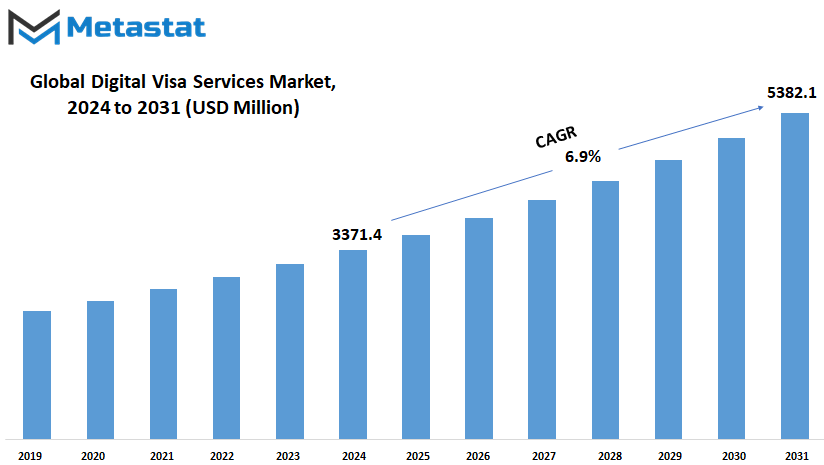MARKET OVERVIEW
The Global Digital Visa Services market is set to be the cornerstone of the travel and immigration industry within the coming years. It will structurally change how individuals and companies work out the process of applying for a visa, using technology to make the process easier and more productive. As digital solutions continue to embed themselves into visa services, their influence will span across borders toward the global travel environment, making it interlinked and more accessible.
The Global Digital Visa Services market will have deployment and the introduction of advanced technologies, through which applications for a visa will be easier. The automation systems along with artificial intelligence will perform tasks that required extensive manual efforts in verifying documents and processing the applications. It will expedite the visa issuance processes sans errors, making it convenient for the travelers as well as immigration authorities.
Increased utilization of digital visa services will bring new features, thereby reinventing the user experience. Biometric authentication methods offer enhanced security and assurances that applications are handled with far greater accuracy. Real-time updates and tracking will also be enabled via this digital platform, which in turn will help applicants to access their visa applications and receive notifications on time in case any further action is required. These developments are part of addressing the growing clamor for a more transparent and user-friendly means of applying for a visa.
Secondly, there will be greater collaboration in the Global Digital Visa Services market between governments and private entities. Governments will not only seek to utilize the efficiencies availed by digital solutions but also ensure such technologies are exploited in a manner that serves national security and regulatory imperatives. On the other hand, the private companies will concentrate on software and service development that is innovative for a wide range of needs of international travelers and organizations. In this regard, the synergy between the public and private sectors will really act as a catalyst in bringing about this future landscape of digital visa services.
The constantly evolving market will, therefore, give way to a number of challenges associated with digital transformation. Data security and privacy will continue to be in question, and measures shall be made towards ensuring data security. The implementation of robust encryption techniques and compliance with international standards on protection of data shall be important in gaining the trust of users and stakeholders. Efforts will also be directed at ensuring a wide subset of underserved regions or technological resource-scarce users get better access to digital visa services.
The incorporation of emerging technologies, such as blockchain, will also give a hefty boost to the evolution of the Global Digital Visa Services market. Blockchain would provide a decentralized, tamper-proof record of each and every visa transaction, hence enhancing transparency and maybe even the security of the application process beyond what the current mechanisms have achieved. It is such innovations that will make the global visa system resilient and efficient.
In other words, the Global Digital Visa Services market is likely to change radically by embracing advanced technologies and innovative solutions. The future promises an improved visa application process that is faster, more secure, and transparent. As this market continues to develop, it will be even more instrumental in facilitating international travel and mobility, reflecting further integration of digital technologies in global systems.
Global Digital Visa Services market is estimated to reach $5382.1 Million by 2031; growing at a CAGR of 6.9% from 2024 to 2031.

GROWTH FACTORS
The global Digital Visa Services market would record outstanding development supported by a host of high-level factors: the demand for smooth and seamless solutions of visa processing acts as one of the prime drivers. Due to the rise in international travel across business, tourism, and education, the need for digital solutions making the application process less cumbersome has gone into overdrive. Such services are brought about with convenience and speed courtesy of digital visa services. These services are quicker as compared to the traditional methods applied earlier.
The technological advancements also mark the future in the Global Digital Visa Services market. Some commanding technologies influencing the security, efficiency, and accuracy of the visa processing system include artificial intelligence, machine learning, and blockchain. This will be important to automate redundant processes, reduce error risks, and generally improve the user experience in order to appeal both to travelers and immigration authorities.
The market also gains growth from the growing mobile devices and internet connectivity across all parts of the world. Since more people reach out to services either via smartphones or through other digital platforms, demands for mobile-oriented visa solutions will increase. Among all those digital visa services, which will help in seamless integration with mobile devices, will take a significant share of the market.
However, issues may arise that could put a damper on market growth. Data security and privacy are some of the considered major deterrents. Since digital visa services involve very sensitive personal information, there must be strong measures to ensure no leakage of data or even actual cyber-attacks. The existence of different regulations across countries poses a threat to the regulatory challenges by complicating the implementation of a standard digital visa system across the board.
Despite the challenges, emerging market opportunities for growth abound in the Global Digital Visa Services market. This is especially the case in regions with high growth in the travel industry. Thus, with infrastructure development and the expansion of international connections, these regions might well see a spur in demand for digital visa services.
Moving ahead, the market will continue to change with increased innovation in technology and expansion of digital solutions across more countries. With changing needs being met with more innovative solutions, further growth will be witnessed in the Global Digital Visa Services market. Addressing the security concerns and overcoming regulatory complexities will help the market to avail new opportunities for growth in reach and applications.
MARKET SEGMENTATION
By Type
The Global Digital Visa Services market is fast-changing, greatly influenced by the accelerated advance in the development of technology and the changing needs of consumers. The changes in this market have involved various services engaged in the digital processing of visas, which have become very critical to all travelers globally.
One of the critical growth areas for the Global Digital Visa Services market has been the segmentation type, which is focused clearly on individual travelers and group travelers. In each category, the needs and preferences will vary, so most of such categories relate to diversified demand associated with modern global travels.
The largest cohorts of customers at the forefront of this business are individual travelers. Increased demand due to a hassle-free and efficient way of dealing with travel documentation calls for digital visa services that should be able to provide for each individual’s need. Such services make the process of applying for visas easy, less time-consuming, and provide support during the process. A single tourist can apply for a visa, track its status, and receive updates from the comfort of a digital platform. This is indeed a convenience that will be availed of in large numbers, be it business or leisure travelers.
On the other hand, different sets of needs of Group Travelers have to be resolved by the digital service of a visa. The segmentation usually consists of business delegations, tour groups, and family trips. It may be rather complex and resource-intensive in trying to get a visa for several people; the digital solution simplifies such processes through bulk processing and centralization in handling. This ensures timeliness and efficiency in visa issuance and processing of the whole group.
In perspective, the Global Digital Visa Services market will continue changing due to continuous development in technology and the growing need for seamless travel experiences. Artificial intelligence and blockchains are a few of the promising technologies that will also create differences in making digital visa services more effective and safe. For example, AI can make application processing more accurate and, simultaneously, blockchain will give a more secure platform for storing and verifying visa information.
The future of Global Digital Visa Services will be more personalized and adaptable. Due to the evolution of travel patterns and needs, digital visa services will increasingly have to be able to offer even more options for individual and group travelers that fit specific preferences. This means embedding user feedback, adapting to new regulations, and staying in front of technological trends.
By Application
The Global Digital Visa Services market is experiencing dynamic movement with successive advancement in technology to refurbish the outlook towards international travelling. There are various applications of this market with increased growth potential since digital solutions will increase in demand within the various practices of applying for the services. The three key segments of this market are tourism, business travel, and others, based on which the future trends and developments of the industry can be predicted.
One of these major sectors is the tourism sector, which is being transformed by digital visa services. As a result, the increase in demand for digital visa solutions will be high because, today, everyone yearns to have a smooth and quick basic life. Travel will be simplified for tourists since application procedures would be much easier and faster at the same time, ensuring safety in the process. This will make international tourism less cumbersome and provide a smoother experience from application to arrival.
Digital visa services for business travel will be one of the important tools that will be in demand by companies operating across the border. The possibility to handle the process of application electronically will facilitate life for business people, reduce administrative burdens, and quicken travel preparations. Companies count on digital services to increase business dependencies should ensure their employees can move freely and efficiently within the context of meetings, conferences, and other work activities. This will not only increase productivity but also facilitate global business operations as it would make traveling across borders much more feasible.
Others involve applications for education purposes, traveling to receive medical attention, and personal visits. In all these areas, improvements in digital visa services will be advantageous. For instance, foreign students will be able to apply for a visa more conveniently and patients visiting foreign nations for treatment will be able to apply for it with ease. Flexibility and efficient services that are digitized will meet various needs and this will lead to the overall growth of digital services in the market.
|
Report Coverage |
Details |
|
Forecast Period |
2024-2031 |
|
Market Size in 2024 |
$3371.4 million |
|
Market Size by 2031 |
$5382.1 Million |
|
Growth Rate from 2024 to 2031 |
6.9% |
|
Base Year |
2022 |
|
Regions Covered |
North America, Europe, Asia-Pacific Green, South America, Middle East & Africa |
REGIONAL ANALYSIS
The global market for Digital Visa Services is an amalgamation of regions with varied prospects: a cluster of opportunities and challenges. Geographically, the Global Digital Visa Services Market has been segregated into key regions: North America, Europe, Asia-Pacific, South America, and the Middle East & Africa. Each of these regions will see tremendous growth as the wave of digital transformation spreads outwards.
The serious development of the digital visa service market in North America will take place, especially in the U.S., Canada, and Mexico. These countries are in the lead regarding technological innovation, and it is expected that this will favor further prevalence of digital solutions in addressing visa issues. The focus will be on streamlining processes, enhancing user experience, using advanced technologies; hence, this would be a benchmark for other regions.
The European region, comprising the UK, Germany, France, Italy, and the Rest of Europe, will also be a key factor in the development process for digital visa services. Regional analysis- The European market is expected to focus on developing more integrated and effective systems due to the robust regulatory frameworks and focus on data protection across the region. This will further ensure smoother international travel and ease for applicants seeking visas.
The region consists of major countries like India, China, Japan, South Korea, and the Rest of Asia-Pacific. Due to the multi-diversity in population and high rate of internet penetration, growing technological enhancement, demand for sophisticated digital visa solutions, the growth in the region is expected to be with brisk speed. Countries in the region will likely acquire technology in order to cope with volumes of travel and migration at an international level, which are on their consequential rise.
This growth in the digital visa services market is also likely to be witnessed in South America, comprising Brazil, Argentina, and the Rest of South America, due to growing economic stability and an increasing focus on digitalization that will drive the development of more efficient visa processing systems, thereby helping this region grow in terms of connectivity and smoother international interactions.
Similar improvements will be witnessed in digital visa services in the Middle East & Africa, including GCC Countries, Egypt, South Africa, and the Rest of Middle East & Africa.Driving this will be improved access and efficiency, on the back of continuous investment in technology and infrastructure. This strategic region and its growing international connections provide high potential for such improved digital visa solutions.
Eventually, it is expected that the Global Digital Visa Services market will make a giant leap forward in these regions. Each area, with changing technological advancement, will receive and reveal a better visa application procedure in the world. Development and further adoption of digital solutions will lie at the heart of enabling the future shape of global travel and migration.

COMPETITIVE PLAYERS
The Global Digital Visa Services market keeps changing and growing with the ever-increasing demand for visa processing in a more straightforward and efficient manner. Since technology keeps on transforming with each passing day, and traveling to other countries has also gone global, there would be more demand arising in the digital visa service market. The way applications for a visa were traditionally made keeps changing with the modern, more improved digital ways that offer a service that will be easier and more effective for them.
Key companies involved in the Global Digital Visa Services market include renowned brands such as VFS Global Group, VisaHQ, iVisa, CIBT, Mühlbauer Group, Atlys, VisaMetric, 4G Identity Solutions, BLS International Services Limited, and Teleperformance TLScontact. All these companies are very much into reshaping the dimensions of visa processing, with each of them offering a range of innovative solutions to diverse requirements of travelers and governments at large.
A good example is VFS Global Group, the company at the center of this transformation, offering comprehensive visa and consular services to both governments and travelers. Specifically, the company is focusing on digital solutions with a view to making the application process as easy and widely accessible as possible. Similarly, VisaHQ offers a suite of digital visa services targeting the individual traveler and the corporate client in their effort to guarantee efficiency and accuracy in handling visa applications.
iVisa and CIBT are also major players, and have developed e-marketplaces where one can apply for a visa hassle-free from any corner of the world. These do not require personally visiting embassies or consulates to apply for a visa, hence making the entire process more convenient for the user. Mühlbauer Group and Atlys are taking this notion forward with advanced technologies that would reinforce security and make the verification process simpler.
VisaMetric and 4G Identity Solution have contributed to the market by concentrating on biometric solutions and verification technologies in identity. These have been very vital in enhancing digital visa application accuracy and security. BLS International Services Limited and Teleperformance have also played a major role in full-service offerings of digital visas, facilitating smooth and efficient processing through their respective digital platforms.
In the future, huge growth is expected in the Global Digital Visa Services market. Further integration of digital technologies into the processing of visas is expected to add greater efficiency and security. With increased adoption by travelers and governments alike, the process of securing a visa itself should be much easier and more straightforward overall. This continuing innovation in the field is poised to shape the future of international travel and visa management.
Digital Visa Services Market Key Segments:
By Type
- Individual Travelers
- Group Travelers
By Application
- Tourism
- Business Travel
- Others
Key Global Digital Visa Services Industry Players
- VFS Global Group
- VisaHQ
- iVisa
- CIBT
- Mühlbauer Group
- Atlys
- VisaMetric
- 4G Identity Solutions
- BLS International Services Limited
- Teleperformance (TLScontact)
WHAT REPORT PROVIDES
- Full in-depth analysis of the parent Industry
- Important changes in market and its dynamics
- Segmentation details of the market
- Former, on-going, and projected market analysis in terms of volume and value
- Assessment of niche industry developments
- Market share analysis
- Key strategies of major players
- Emerging segments and regional growth potential








 US: +1 3023308252
US: +1 3023308252






